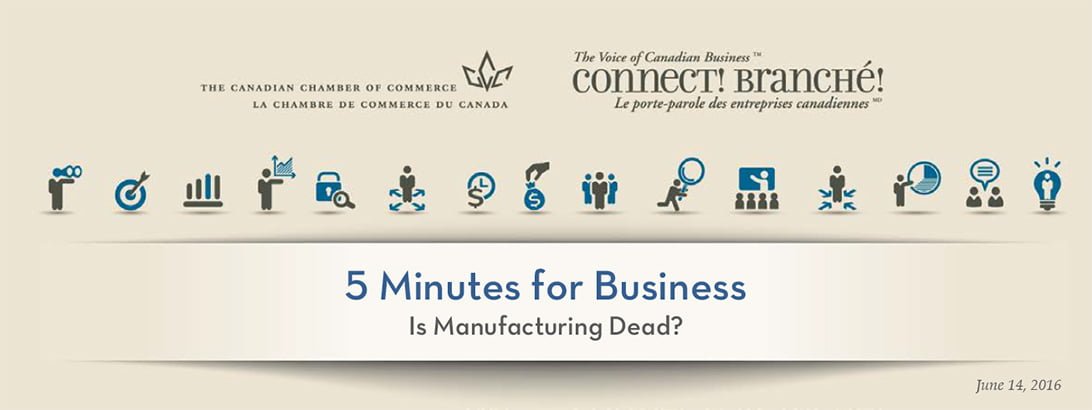In this edition of 5 Minutes for Business, Hendrik Brakel, Senior Director of Economic, Financial and Tax Policy at the Canadian Chamber of Commerce, looks at the state of manufacturing in Canada.
For years, Canada’s manufacturing sector has been described as ailing, depressing, in crisis, faltering and on a road to nowhere. Even the Bank of Canada has described manufacturing as disappointing, mainly because of the decline in employment and still modest gains in investment. Should we throw in the towel and refocus on efforts on exporting pop stars like Justin Bieber and Drake?
Read 5 Minutes for Business to find out.
It’s not easy being a manufacturer in Canada. Not only do you have to deal with a fluctuating currency, skills shortages and soaring electricity costs in Ontario, you also get your feelings hurt by gloomy economists and journalists who constantly carp about your imminent death. For years, Canada’s manufacturing sector has been described as ailing, depressing, in crisis, faltering, and on a road to nowhere.
Even the Bank of Canada has described manufacturing as disappointing, mainly because of the decline in employment and still modest gains in investment. Should we throw in the towel and refocus our efforts on exporting pop stars like Justin Bieber and Drake?
Not so fast. Canada’s manufacturing exports shot up 13.5% in 2015 (autos rose 15%, aerospace grew 14%, industrial machinery climbed 8.4%). The jobs numbers remain gloomy, but over the past decade manufacturing employment has been declining in every country in the OECD. Canada has maintained the most jobs out of any country in the G7.
Output is rising, but employment is not, so let’s ask a different question: Is manufacturing the new agriculture?
Imagine if 70 years ago, you had predicted that farmers (at the time our most common occupation, employing a third of Canadians) would become so incredibly productive and efficient that just 2% of our population would work in agriculture, and these folks would be able to feed us AND produce millions of tonnes of surplus for export to other countries. Sounds crazy, right? That’s exactly what happened (In 2015, 1.8% of Canadians worked in agriculture and exported $61 billion.) as back-breaking labour became automated and advances in fertilizer and genetics drove crop yields to the stratosphere.
A similar transformation has been underway in manufacturing for decades. Toronto used to have a “garment district” between Bathurst and Spadina, and Montreal had its “rag trade” on rue Chabanel with tens of thousands of workers in tight rows hunched over sewing machines. Those jobs are mostly gone, and today, instead of a textile industry, we have a fashion industry with incredible designers like Roots, Lululemon and so many others. The design, marketing, logistics and management are highly paid and done here while the clothes are mostly assembled by machines or overseas.
And today, incredible advances in manufacturing technology, from robotics to 3D printing to artificial intelligence, are making manufacturers orders of magnitude more productive than anything we have seen in history.
It’s an exciting opportunity, but highly competitive. If Canadian manufacturers try to compete on costs with countries like China and Mexico, then Canada will lose. But if we invest in new technology and lead in innovation and in R&D, then we can succeed and win in manufacturing.
This is why we’re so excited about General Motors announcing 1,000 highly skilled, new engineering jobs that will focus on self-driving cars. That’s the future of manufacturing: deploying Canadian brains to innovate and create new products. The Canadian Chamber is releasing a new report in the near future on how to support this transformation and induce even more innovation and attract more investment.
Manufacturing is not dead. It’s being reborn.
For more information, please contact :
Hendrik Brakel
Senior Director, Economic, Financial & Tax Policy
613.238.4000 (284) | hbrakel@chamber.ca



